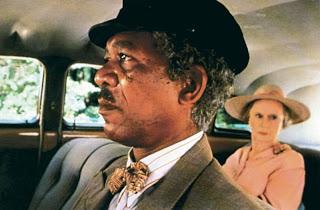
"I think it's wonderful how things are changing."
It's fashionable to pick on Driving Miss Daisy (1989), an unassuming drama that unexpectedly won Best Picture. Claims of racism by Spike Lee and others seem overblown; Alfred Uhury's play is a study in friendship rather than a message picture. But even on its own terms, Daisy is an trifle.Retired schoolteacher Daisy Werthan (Jessica Tandy) lives alone in 1950s Georgia, to her son Boolie's (Dan Ankroyd) chagrin. Boolie hires Hoke Colburn (Morgan Freeman) as Daisy's chauffeur. Their initially frosty relationship soon thaws; they both feel isolated from society, Daisy forced to downplay her Judaism and affect great wealth, while Hoke suffers the indignity of blackness under Jim Crow. Over the years, their relationship grows beyond employment to friendship.
Driving Miss Daisy revolves around their friendship. Daisy's as much an outcast as Hoke, defined by self-delusion. Whether arguing about a route to the grocery store or concealing her religion ("my name's of German extraction"), she refuses to confront her true personality. Hoke struggles to prove himself, shamed by his illiteracy and needled by Daisy's mockery. He offers only quiet protests when Daisy won't let him see Martin Luther King speak, grumbling that her progressivism is a pose.
But Daisy doesn't recognize her hypocrisy, merely Hoke's friendship. And there lies the problem. That Hoke endures Daisy's gibes doesn't demean him. The problem is that he's defined entirely by their relationship. Hoke has a wife and children but we never meet them; even after leaving Daisy's employ, she's his whole life. To some viewers, Hoke feeding Daisy pie in a nursing home is sweet and life-affirming; others find it soul-sucking pap. Your mileage may vary.
Driving Miss Daisy's problem isn't race so much as mediocrity. Bruce Beresford's bloodless direction savors candle lit rooms and crepe myrtles without affecting style. The movie has the static approach beloved of '80s Oscar bait; lifeless plot, tame dialogue, off-screen drama. Hooligans bomb Daisy's temple and Hoke recounts a long-ago lynching, neither experienced firsthand. There isn't enough substance to drive the picture, leaving the actors to redeem it.
Jessica Tandy became the oldest Best Actress winner at 89. Tart, reserved and quietly vulnerable, her performance is stellar. Morgan Freeman's grace, dignity and humor save Hoke from being mere stereotype; he's compelling, whatever the character's flaws. Unfortunately, Daisy doomed Freeman to a career playing similar characters. Dan Ankroyd's role is utterly thankless, fretting about his mother and condescending to Hoke. Patti LuPone and Esther Rolle have even smaller roles.
Like many Best Picture winners, Driving Miss Daisy suffers from disproportionate backlash. Without an Oscar, few would remember it; with one, it's a target of vitriol, especially compared to racially-charged non-nominees Do the Right Thing and Glory. Daisy's neither terrible nor offensive, merely forgettable.

